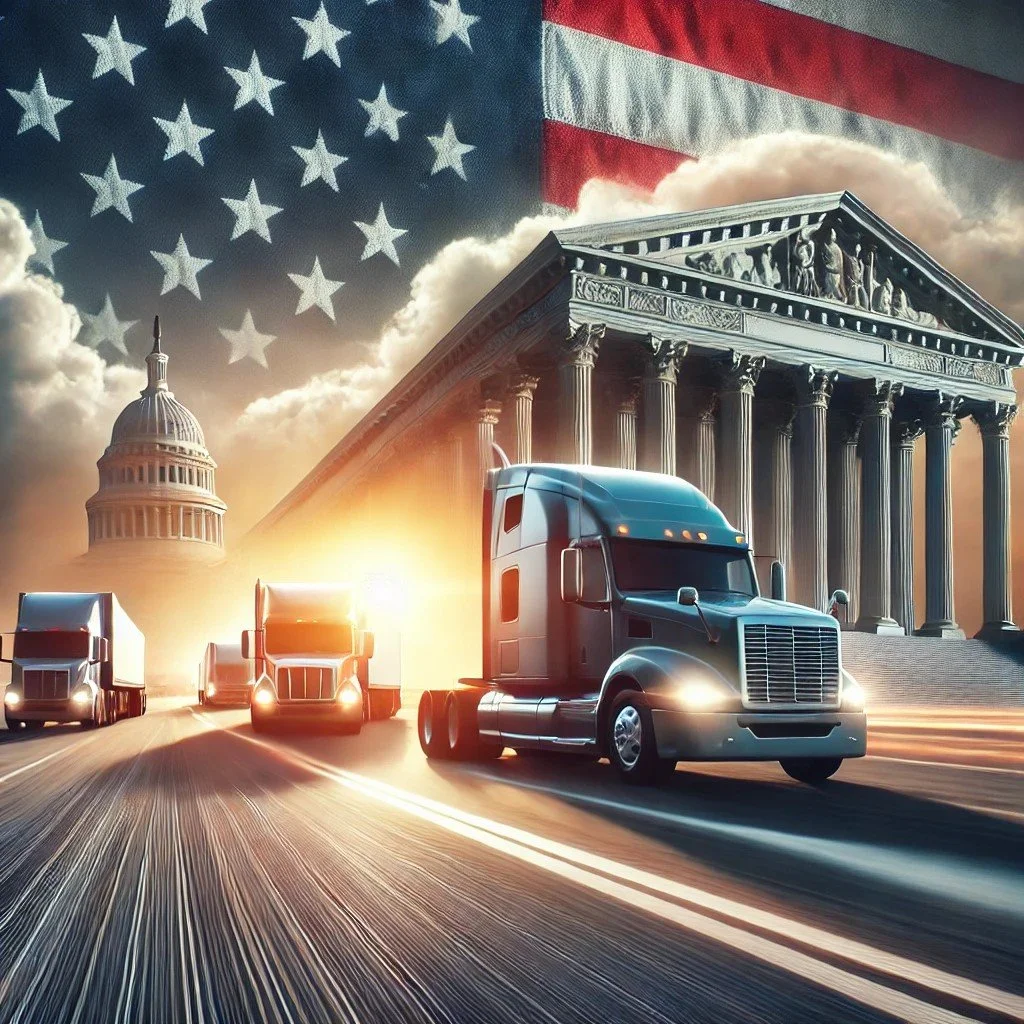Top 10 Changes in Trucking Expected Under President Trump’s New Term
10 Anticipated Changes in Trucking Under President Trump
As former President Donald Trump prepares to take office once again, his administration is expected to implement policies that could reshape the trucking and logistics industries. From revisiting emissions standards to imposing tariffs, here’s a comprehensive look at potential changes and their impact on the trucking sector.
1. Reduced Emissions Standards
Trump’s administration may roll back stringent emissions standards introduced by the Biden administration. The expected adjustments could lower compliance costs for fleets but may slow down environmental progress in the trucking industry. The Clean Freight Coalition estimates the current emissions regulation could cost the industry as much as $1 trillion. Lowered standards would mean more affordable diesel-powered trucks and a reduced push for electric trucks.
2. Increased Tariffs on Imports
Trump has expressed intentions to impose tariffs on various imports, with a potential 60% tariff on goods from China and a 100% tariff on certain vehicles from Mexico. These tariffs, though initially raising costs, could encourage domestic production and subsequently increase demand for freight services as supply chains shift towards North America.
3. Impact on Trucking Electrification
Lowered emissions regulations may slow the transition to electric vehicles. Despite these expected rollbacks, major truck manufacturers, including Volvo and Daimler, have committed to achieving carbon neutrality by 2040 as part of the Paris Climate Accords. Trucking companies may see a temporary dip in electric vehicle adoption rates, but long-term commitments to electrification remain.
4. Adjustments to Speed Limiter Rules
While the Biden administration proposed mandating speed limiters in trucks, the Trump administration may delay or block this rule, citing a preference for industry-led solutions. Speed limiter rules have received mixed feedback, with larger carriers generally supporting the mandate, while owner-operators argue it would place independent drivers at a disadvantage.
5. Corporate Tax Cuts for Domestic Production
Trump’s policies are likely to favor companies producing goods domestically. Proposed cuts to corporate tax rates could make U.S. manufacturing more attractive, leading to growth in domestic production, which would have a ripple effect on freight demand. Lower corporate taxes would also mean reduced operational costs for trucking businesses.
6. Relaxed Autonomous Vehicle Regulations
The Trump administration is expected to adopt a more flexible approach toward autonomous vehicle (AV) technology, possibly delaying proposed rules and allowing companies to proceed at their own pace. This approach could lower entry barriers for AV technology companies and accelerate the adoption of automated trucking solutions.
7. Independent Contractor Status
The Biden administration’s Department of Labor rule made it easier for drivers to be considered employees rather than independent contractors. Trump’s return to office may lead to a rollback of this classification, giving drivers the flexibility to maintain independent contractor status—a change many in the trucking industry see as positive for both drivers and carriers.
8. Increased Infrastructure Spending
Trump’s infrastructure focus could lead to new investments in highways, bridges, and truck parking, building on projects that began under previous administrations. Improved infrastructure would reduce bottlenecks, support higher freight volumes, and improve overall industry efficiency.
9. Potential Federal Tort Reform
Trump’s administration may pursue tort reform to curb “nuclear verdicts” (multi-million-dollar lawsuit awards). Reducing the liability burden in accident-related lawsuits could lower insurance costs for carriers and protect trucking companies from catastrophic financial losses.
10. Focus on Domestic Energy Production
Trump’s “drill, baby, drill” policy could stabilize fuel prices, ensuring more consistent costs for trucking companies. By fostering energy independence, the trucking industry may benefit from reduced exposure to global oil price fluctuations, maintaining affordable diesel prices.
New Tariffs on Imports
Trump’s suggested tariffs on imports, including up to a 60% tariff on goods from China, could increase domestic manufacturing and eventually raise freight volumes. Truck traffic at the U.S.-Mexico border has already reached record levels, partly due to tariff policies. However, higher tariffs could also lead to immediate inflationary effects.
OEMs and Continued Electrification
Despite the expected regulatory rollbacks, many original equipment manufacturers (OEMs), such as Volvo, have made strides toward electrification and have set ambitious carbon-neutral targets. Five of the seven major over-the-road truck OEMs operate under European parent companies, aligning them with global commitments to achieve zero emissions.
Truck Parking and Safety Improvements
The Truck Parking Safety Improvement Act, championed by the Owner-Operator Independent Drivers Association (OOIDA), remains a priority. With new funding allocations, the Trump administration is expected to expand safe truck parking options, alleviating the parking shortage that often forces drivers to park in unsafe areas.
Industry Reaction and Stakeholder Statements
Both the American Trucking Associations (ATA) and the Truckload Carriers Association (TCA) have issued statements expressing optimism about Trump’s return to office. ATA CEO Chris Spear noted Trump’s prior focus on trucking and expressed a desire to work toward repealing emissions standards that are “technologically achievable.” OOIDA President Todd Spencer also congratulated Trump, expressing optimism about proposed safety improvements for truckers.
Need Help Staying Compliant?
Allcom Insurance is here to support you through regulatory changes, making sure you stay compliant while keeping costs manageable. Contact us at 866-277-9049 or visit www.allcomins.com for a personalized consultation.

